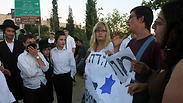
'I want to be Jewish and secular without feeling the need to apologize for it' (archives)
צילום: גיל יוחנן
Secular Judaism is still heart of Zionism
Op-ed: I would like to live in a country where I can wake up on Saturday morning and nonchalantly drive to a synagogue in order to feel a connection to my Jewish nationality.
I recently got caught in a stormy family debate over my tendency to deal with Jewish identity. The family was concerned over the fact that in the past year I got the chance to see what a synagogue is more than once, start a secular Talmud study group and, oddly enough, insist on staying in Jerusalem. They wondered whether they should "be concerned."
In a trivial manner, the discussion shifted to the question of God's existence, and immediately after I said I don't really think there is one, my mother screamed: "No, take that back. Quickly, say it isn't true," as if the five-second rule regarding bacteria applies here too. Yes, my mother – a Tel Aviv resident, a bacon lover, a leftist, who likes to refer to herself as a "Buddhist."
This story embodies the deep deviation of the secular society from its course: We've become such devout seculars that we've already forgotten what it means.
Zionism, 100 years ago, was a secular startup – a national home for the Jewish people. Hardly anyone spoke about religion and mitzvot. Even Rabbi Reines, one of the forefathers of Religious Zionism, talked mostly about the importance of the aspects of emotion, hope and faith, and barely discussed God or mitzvot – because, like Yeshayahu Leibowitz later on, he saw them as an almost personal matter.
The tight connection between the Jewish people and the Jewish religion is an invention only Jews could think about, but paradoxically this connection is the main reason for the fact that a growing part of my generation doesn’t understand what it is doing here. When a secular person gets the feeling that there is no point in being Jewish if he travels on Shabbat and eats shrimps, he stops finding any value in Zionism as well, and so, with greater ease, he moves to Berlin, evades taxes and cheats the Jewish neighbor who buys a car from him.
Nations in the world insist on keeping their culture and tradition and their state as an expression of a shared destination. They succeed in doing that without fighting, and that may be what our nation has failed in: So many arguments about who is a Jew have made us forget that we all are. After all, that's why we went to the trouble of drying swamps – so that we'll all have a Jewish home where we will feel comfortable, even if our Judaism is secular and even if we have chosen not to believe in God.
I would like to live in a country where I can wake up on Saturday morning and nonchalantly get into the car and drive to a synagogue in order to feel a connection to this Jewish nationality of mine, to feel that this place is also mine, and then to drive to the beach without feeling like I have failed anyone. I would like to be able to conduct a proper Passover Seder, teach my nephews the historical story of their people and why it is important to be sensitive towards the foreigners living next to them, without my brother asking me if I am becoming religious. I would like to be able to fast on Yom Kippur in order to be a better person, to engage in real self-examination once a year – with myself, and not with an external god who settles the score with me over what I did for him this year.
I want to be Jewish and secular without feeling the need to apologize for it, and mainly without feeling like a minority – because we have slightly forgotten this, but secular Judaism is still the heart of Zionism, and it is still the majority here, even if we don't refer to ourselves as a "sector."
Elisheva Mazya is the CEO of the New Spirit movement in Jerusalem










